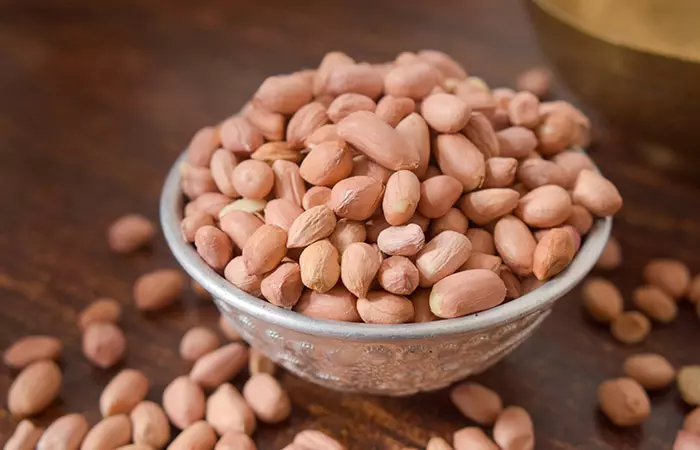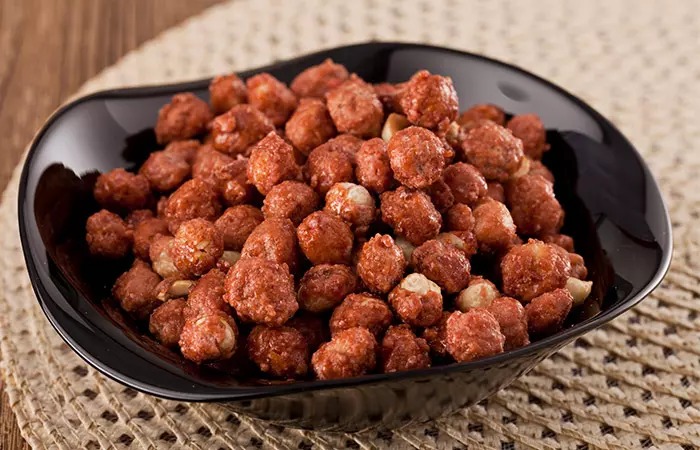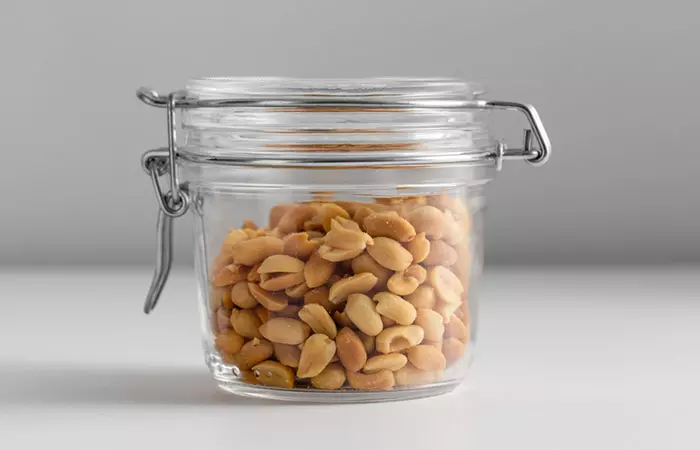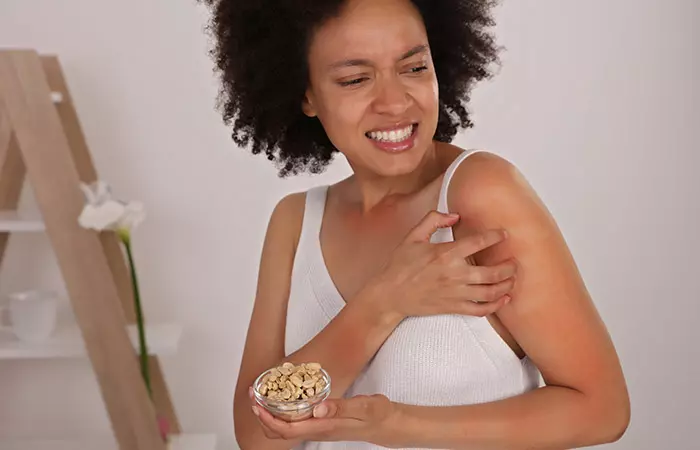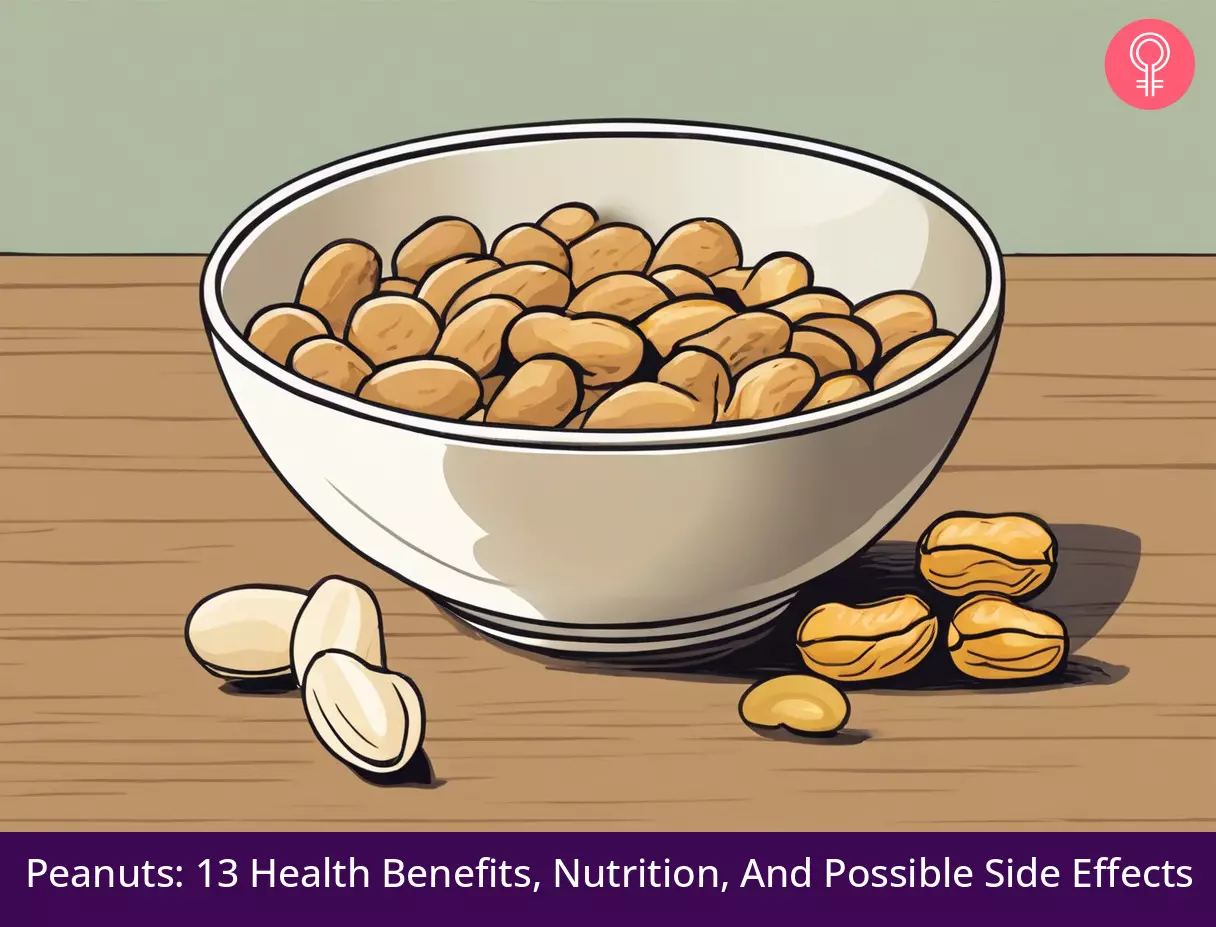What Are The Health Benefits Of Peanuts?
Are peanuts healthy? Check out these amazing peanut benefits to find out. Who Can Use It? It can be consumed by most people. How Often? You can consume up to 42 grams of peanuts per day. Caution Over consumption may lead to bloating, constipation, and diarrhea. People with peanut allergies and chronic digestive issues should avoid them. Those with diabetes should consult their doctor before consuming peanuts.
1. May Promote Heart Health
Eating peanuts may help protect against coronary heart disease (CHD) (1). A study conducted by the Harvard School Of Public Health found that peanuts may lower bad cholesterol (LDL) levels (2). Bad cholesterol leads to plaque development in the blood vessels, and peanuts may prevent this. A study conducted on rats also stated that polyphenol-rich peanut skin extract may reduce the inflammation that causes heart disease (3). The resveratrol in peanuts has antioxidant properties that may help combat heart disease. That is why peanuts seem to have similar cardioprotective effects as other foods containing resveratrol (4). A study conducted by Purdue University found that regular intake of peanuts also lowers triglyceridesi A type of fat/lipid formed from the conversion of extra calories that the body doesn’t need right away. , further promoting heart health. This effect can be attributed to the presence of monounsaturated fatty acids, folate, and magnesium (5). Furthermore, a study on rats conducted by Marmara University (Turkey) found that peanuts increase the levels of good cholesterol (6). However, more studies are warranted to understand this effect of peanuts.
2. May Aid Weight Loss
Peanuts are very high in calories, but they contribute to weight loss instead of weight gain (7). Peanuts are energy-dense foods (8). That is why having them as a snack may make you consume fewer calories later in the day. Peanuts elicited stronger feelings of fullness when consumed as a snack than with a meal (9). This may eventually help with weight loss. Some studies suggested that higher nut consumption was not associated with greater body weight gain and may aid weight control (10). Including peanuts in your diet is one way to enhance nutrient intake without causing weight gain (8). Research also shows that the consumption of peanuts and peanut butter can increase feelings of satiety. These could satisfy individuals better than carbohydrate-filled snacks in equal quantities (11).
3. May Prevent Gallstones
Consumption of peanuts is linked to a lower risk of gallstones. A study conducted by the Harvard Medical School and Brigham and Women’s Hospital (Boston) found that consumption of peanuts may lower the risk of gallstones. Men consuming five or more units of nuts (including peanuts) a week are at a lower risk of gallstone disease (12). Women consuming five or more units of nuts a week are at a reduced risk of cholecystectomy (removal of the gallbladder) (13). However, long-term studies are required to understand this benefit of peanuts.
4. May Aid Blood Sugar Control
Adding peanuts or peanut butter to a meal does not spike blood sugar levels. Having them along with a meal high in GL (like a bagel or a glass of juice) may stabilize your blood sugar levels. Peanuts have a GI (glycemic index) score of 14. While the GI of peanuts is 14 (on a 100-point scale), their GL (glycemic load, which tells what a particular food will do to your sugar levels) is just 1 (11). That is why the American Diabetes Association names peanuts as a diabetes superfood. The fiber in peanuts also helps lower blood sugar levels. They also contain magnesium and other healthy oils that play a role in this aspect (11). One study conducted by the Federal University Of Vicoça (Brazil) on obese women found that consuming peanuts or peanut butter right in the morning may control blood sugar levels throughout the day (14). Another study conducted by the Harvard School of Public Health found that higher intake of peanuts and peanut butter can help reduce the risk of type 2 diabetes in women (15). Additionally, daily intake of a diet enriched with peanuts over 24 weeks could improve health parameters in patients with type 2 diabetes. The rich nutritional profile of peanuts is responsible for this, which includes monounsaturated fat, fiber, arginine, niacin, folate, and vitamin E (16). A food blogger shared how eating peanut butter helped keep her blood sugar levels stable while preparing for her mid-term exams. She said, “My favorite ways to have natural peanut butter are to spread it on whole wheat toast or on apple slices. It kept me focused, awake, and motivated. My blood sugar didn’t crash after I ate it, and it kept me satisfied until my next meal (i).”
5. May Reduce Cancer Risk
High intake of peanuts (including other nuts) has been associated with a reduced risk of colorectal cancer. The isoflavonesi Plant-based compounds that mimic estrogen and are known for their antioxidant, antimicrobial, and other health properties. , resveratrol, and phenolic acid found in peanuts have anticancer properties which may help reduce the risk of cancer (17). A study conducted in The Netherlands found that peanut intake is also associated with a reduced risk of postmenopausal breast cancer (18). Peanuts were also found to prevent gastric and esophageal cancers among older American adults. When comparisons were made, individuals who did not consume any nuts or peanut butter were at the highest risk of developing these cancers (19). However, there is a concern with respect to peanuts and cancer. Peanuts might be contaminated with aflatoxins, a family of toxins produced by certain fungi. These toxins may increase the risk of liver cancer (20). A study conducted by the University of Georgia (USA) found that the resveratrol found in peanuts possesses potent antioxidant properties that help in reducing the risk of cancer (21).
6. May Treat Erectile Dysfunction
Peanuts are rich in arginine, which is an essential amino acid (22). Arginine has been studied extensively as a possible treatment for erectile dysfunctioni The sexual inability in men (impotence) to get and keep an erection firm enough to have a sexual intercourse. (23), (24). More research is required to understand if arginine alone can help with the treatment of erectile dysfunction. But, studies confirm that oral administration of this amino acid in combination with a herbal supplement (called pycnogenol) can treat erectile dysfunction (24).
7. May Boost Energy
Peanuts are a rich source of protein and fiber that assists in the conversion of carbohydrates into energy (25). The protein content of peanuts is around 25% of the total calories (26). The fiber and protein combination in peanuts slows down the digestive process to facilitate a steady release of energy into the body. Eva De Angelis, Dietitian Nutritionist, says, “Likewise, their nutrient profile makes them superb pre-workout snacks, especially peanut butter with no added sugar, salt, or oils, which is easier to eat.” However, more research is required to understand this benefit of peanuts.
8. May Relieve Symptoms Of Polycystic Ovarian Syndrome (PCOS)
There is little research in this regard. Anecdotal evidence suggests that peanuts may help treat PCOS as they contain monounsaturated fats. Some research states that a diet high in these fats could help improve the metabolic profile of women with PCOS (27).
9. Have Antioxidative Properties
Peanuts are rich in numerous plant compounds and antioxidants. Most of these compounds are available in the skin of peanuts, which should be eaten raw to get all of its benefits (28). Some of the plant compounds that are readily available in peanuts include resveratrol, coumaric acid, and phytosterols that help impair the absorption of cholesterol, isoflavones, and phytic acid found in plant seeds (29), (30), (31).
10. May Help Protect Against Alzheimer’s Disease
Foods that are rich in niacin – like peanuts – may protect against Alzheimer’s disease and age-related cognitive decline (32). Peanuts are an excellent source of niacin and vitamin E, both of which have been shown to protect against Alzheimer’si A neurologic disorder that starts slowly and progressively worsens, affecting memory, thinking, and behavior. disease. A study conducted on 4000 people aged 65 years and older found that niacin from food slows down the rate of cognitive decline (11).
11. May Promote Skin Health
As per anecdotal evidence, peanut consumption may protect your skin from sunburn and damage. The vitamin E, magnesium, and zinc found in peanuts may fight bacteria and make your skin glow. Beta-carotenei A precursor of vitamin A that promotes eye health, strengthens skin’s defenses against UV rays, and reduces risk of certain cancers. , an antioxidant and anti-inflammatory compound available in peanuts, may also help improve skin health. However, research in this aspect is limited.
12. May Improve Hair Health
There is a lack of scientific research linking peanuts to hair growth. As peanuts contain all the amino acids and lots of protein, they may be a good supplement to a diet for hair growth (33).
13. May Boost Sperm Count
Research sheds light on the potential benefits of peanuts in improving male reproductive health. In an extensive 14-week study called the FERTINUTS trial, 119 healthy men between the ages of 18-35 were divided into two groups: one consumed a Western-style diet enriched with 60 g of nuts daily, while the other adhered to the same diet but excluded nuts. The results indicated that the group incorporating nuts exhibited significant enhancements in various conventional semen parameters, including total sperm count, vitality, motility, and sperm morphology (34). While more research is needed to confirm these findings, it underscores the importance of a balanced diet as part of which peanuts may play a role in supporting male reproductive health. So, these are some wonderful peanuts benefits. Peanuts are replete with nutrients. They are nutritionally dense and healthy. In the following section, we will look at the peanut’s nutrition profile.
Nutritional Profile Of Peanuts
According to the U.S. Department of Agriculture, 100 grams of peanuts contain (35): Energy – 567 kcal Protein – 25.8 g Dietary fiber – 8.5 g Carbohydrates – 16.13 g Sugars – 4.72 g Iron – 4.5 mg Calcium – 92 mg Sodium – 18 mg Potassium – 705 mg Peanuts are rich in several vitamins and minerals. They are excellent sources of vitamin E, vitamin B1 (thiamine), vitamin B3 (niacin), vitamin B9 (folate), biotin, copper, magnesium, manganese, and phosphorus. These are all essential to maintain body metabolism and reduce the risk of several ailments. Peanuts are rich in monounsaturated and polyunsaturated fatty acids that lower heart disease risk. They are also abundant in the essential plant-based proteins. The recommended daily allowance (RDA) for protein in adults is 56 g for males and 46 g for females (36).
How To Eat Peanuts?
It is important that you boil peanuts before consuming them. Though raw peanuts are nutritionally similar, they may carry the risk of aflatoxin (a potent toxin). Some research also shows that boiling peanuts enhances their antioxidant content (11). Boiled peanuts have a two to four-fold increase in their isoflavone antioxidant content.
Best Ways To Add Peanuts To Your Diet
You can add raw or boiled peanuts to your evening salad, or your breakfast cereal with them. You can also add peanuts to frozen yogurt. Jesse Feder, RD, CPT, CSCS, says, “It is recommended to eat around 1-1.5 oz worth of peanuts a day. This will provide you with all the health benefits and limit you from eating too much. The amount needed can vary from person to person depending on age, gender, and height.” He says, “The best time to eat peanuts is when it is most convenient for you! However, if you are looking to curb your appetite or have a healthy snack then I would have them before or in between meals. The fat, fiber, protein, and calories can help keep you satisfied for longer periods of time. If you are just looking to get health benefits from peanuts then I suggest eating them whenever you feel is best for you.” He continues, “Some people’s stomachs may have a hard time digesting higher-fat foods. If you are sensitive to eating fats then I suggest you pair the peanuts with another food group and avoid it before bed. This can help ensure you do not experience any unwanted digestive issues.” Apart from this, you can also try out this popular peanut recipe to enjoy the wonderful groundnut benefits.
Honey Roasted Peanuts
What You Need
2 tablespoons of butter 1/3 cup of honey ¼ teaspoon of cinnamon 1 teaspoon of vanilla extract 2 teaspoons of salt (divided) 1 pound of raw peanuts ¼ cup of granulated sugar
Directions You may be surprised to find out that there are many different types of peanuts. Find out more about them in the next section.
Types Of Peanuts
According to the National Peanuts Board, there are four main varieties of peanuts – runner peanuts, Virginia peanuts, Spanish peanuts, and Valencia peanuts (36). These high protein foods are available in various forms like raw, in-shell, shelled, dry-roasted, and oil-roasted. Raw peanuts are the most healthy type of peanuts with numerous health benefits.
How To Select And Store
Shelled and unshelled peanuts that are stored in a cool place have a shelf-life of 1 to 2 months. If they are stored in the refrigerator, their shelf-life can be extended to 4 to 6 months. Opened peanut butter has a shelf life of 2 to 3 months in the pantry and 6 to 9 months in the refrigerator. Peanuts can go rancid and taste bitter if they are kept beyond the expiration date. You can tell a peanut is rancid if it has a slightly fishy, moldy, or sour-milk smell. Eating moldy nuts is problematic due to the presence of aflatoxin, which can lead to aflatoxin poisoning. It may impair liver function and lead to jaundice, fatigue, loss of appetite, and liver damage. Peanuts can be a wonderful addition to your diet. But before you go ahead and start having peanuts, it is better to be aware of the potential side effects they can cause.
What Are The Side Effects Of Peanuts?
Even though there are many benefits of peanut oil and peanuts, they may cause allergic reactions in some people due to the presence of two proteins – arachin and conarachin. The consumption of excess amounts of these legumes also leads to some adverse effects. Aflatoxin poisoning is another serious side effect of peanuts.
Aflatoxin Poisoning
Possible aflatoxin contamination is a cause for concern. Serious aflatoxin poisoning can cause liver cancer and liver failure. It occurs in food products stored in conditions that promote fungal growth (38). You can prevent this by storing peanuts in a place with low humidity and temperature.
May Cause An Allergic Reaction
A study conducted by the Duke University Medical Center found that peanuts may cause potentially life-threatening allergic reactions in some individuals (39). If you develop an allergic response, please rush to the nearest emergency room immediately.
May Inhibit Iron Absorption
Peanuts contain phytates, which are compounds known to inhibit iron absorption. A study conducted by the University of Witwatersrand (South Africa) found that peanuts may inhibit iron absorption (40). How many peanuts does an ounce have? An ounce of peanuts contains about 28 nuts. Can you eat raw peanuts? Absolutely. But, ensure you get them from reputed commercial brands. Check for mold growth and store them in a cool and dry place. Are peanuts ketogenic? Peanuts should not be considered a part of a ketogenic diet. They are considered legumes, and legumes aren’t recommended on a ketogenic diet. What are peanuts called in different languages? Peanuts are called miseria in Spanish, moong phalee in Hindi, cacahuetes in French, and erdnusse in German. How many peanuts should you eat in a day? Anecdotal evidence suggests that you can safely have a handful (16 peanuts/about 42 g) of peanuts daily. What is the best time to eat peanuts? You can have peanuts at any time of the day. However, they are generally eaten as an evening snack. Do peanuts have omega-3? No. Peanuts lack omega-3 fatty acids like EPA and DHA (35).
Illustration: Peanuts: 13 Health Benefits Nutrition And Possible Side Effects

